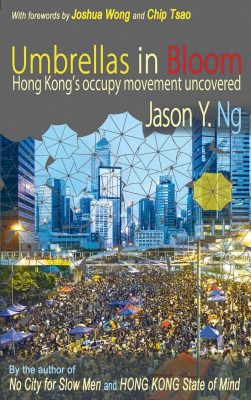 Jason Y. Ng is the author of HONG KONG State of Mind and No City for Slow Men, and has now rounded out a trilogy with Umbrellas in Bloom: Hong Kong’s Occupy Movement Uncovered (all published by Blacksmith Books).
Jason Y. Ng is the author of HONG KONG State of Mind and No City for Slow Men, and has now rounded out a trilogy with Umbrellas in Bloom: Hong Kong’s Occupy Movement Uncovered (all published by Blacksmith Books).
While his previous books simply described modern Hong Kong social dynamics, the latest is explicitly political and an altogether different style than the others. Now that he has written book-length political commentary, Ng has become a crucial player by being first to record the 2014 “Occupy Central” protest movement in any English-language book. It is certainly a must-read.
Umbrellas in Bloom covers a lot of ground. The complex political system of Hong Kong is detailed in very readable fashion, with all the grievances spelled out. Various charts explain how the economy has left the majority of citizens behind, and why so many were upset enough to camp out in protest for all those months. Most of all, the mainland Chinese government is shown to blame for suppressing universal suffrage for the former colony under the so-called “one country, two systems.” Indeed, observers of Beijing and Asia as a whole would do well to read this book and understand the climate of Beijing in relation to Hong Kong.
The language of the book does reflect a specific point of view; do not mistake it as a scholarly, objective report. Ng delves deeply into his unique experiences and certainly takes sides. It makes for a good read, and it’s refreshing that he does not censor himself and expresses his informed opinion with confidence. Perhaps there is an element of preaching to the choir, even getting repetitive at times—“blue ribbon” supporters probably won’t change their minds after reading—but for international readers seeking to understand, the writing style works.
The book is very personal as well. It begins on September 28th, 2014, the day tear gas was fired into crowds as the whole world watched in horror. Then, the tone jumps around as it looks back on the history of Hong Kong politics. The central villain is Chief Executive C.Y. Leung, known as a corrupt stooge of the mainland Chinese government, although the entirety of the Legco system in Hong Kong is highly unrepresentative. As 2017 approached—the promised time for universal suffrage, the Occupy Central movement grew. There was also the Scholarism student movement, led by famous student Joshua Wong (Wong wrote one of the book’s forwards). Then the tale of three villages: the occupied areas of Admiralty, Mongkok, and Causeway Bay. Different ideologies and challenges are showcased, from the police to thugs and internal struggles between different factions and nativists. Some of the most heartwarming sections are about the young people he met, such as Kent and Renee and Hinson, engaging characters all.
In the end, due to a court order of all things, the Admiralty occupation fell. Four days later, on December 15th, the police cleared out the other encampments and the Umbrella Revolution was left to ponder its own legacy. Ng is quite optimistic; surprising considering nothing on paper seemed to get enacted yet, but he does point out that other famous social justice movements throughout history took decades to achieve their goals. His conclusion is definitely that it was worth a try. “The 11 weeks I spent in Umbrellaville were the happiest in all my years in Hong Kong,” he writes. Perhaps the soul of Hong Kong has been changed in subtle ways that are not clear yet, but in the long run history will prove that things did change…
There is so much to learn from Umbrellas in Bloom. However subjective, it is definitely required reading for expats and Sinologists. Whether you were there or only watched on the news from afar, the fallout is still occurring today and enlightened observers should learn what they can.
Highly recommended for all China watchers.
Umbrellas in Bloom is available in Hong Kong bookstores, and can be ordered from Blacksmith Books.
Follow Ray Hecht on Twitter at @RayofChinarabia

